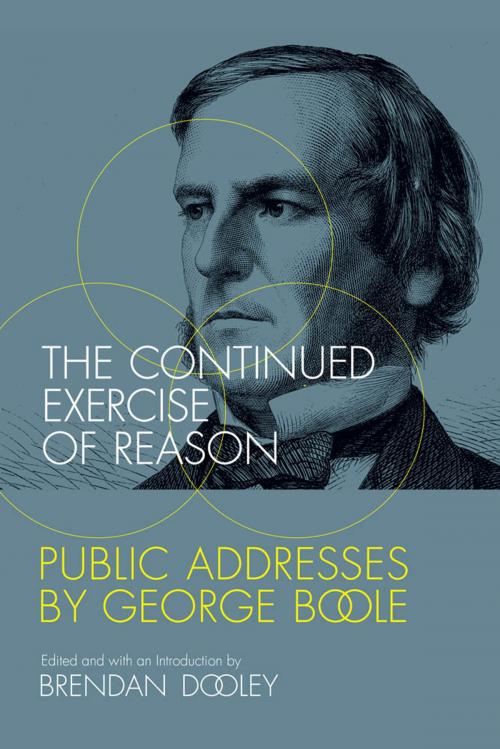The Continued Exercise of Reason
Public Addresses by George Boole
Nonfiction, Religion & Spirituality, Philosophy, Logic, Science & Nature, Science, Other Sciences, History| Author: | ISBN: | 9780262345583 | |
| Publisher: | The MIT Press | Publication: | April 20, 2018 |
| Imprint: | The MIT Press | Language: | English |
| Author: | |
| ISBN: | 9780262345583 |
| Publisher: | The MIT Press |
| Publication: | April 20, 2018 |
| Imprint: | The MIT Press |
| Language: | English |
Lectures, many never before published, that offer insights into the early thinking of the mathematician and polymath George Boole.
George Boole (1815–1864), remembered by history as the developer of an eponymous form of algebraic logic, can be considered a pioneer of the information age not only because of the application of Boolean logic to the design of switching circuits but also because of his contributions to the mass distribution of knowledge. In the classroom and the lecture hall, Boole interpreted recent discoveries and debates in a wide range of fields for a general audience. This collection of lectures, many never before published, offers insights into the early thinking of an innovative mathematician and intellectual polymath.
Bertrand Russell claimed that “pure mathematics was discovered by Boole,” but before Boole joined a university faculty as professor of mathematics in 1849, advocacy for science and education occupied much of his time. He was deeply committed to the Victorian ideals of social improvement and cooperation, arguing that “the continued exercise of reason” joined all disciplines in a common endeavor. In these talks, Boole discusses the genius of Isaac Newton; ancient mythologies and forms of worship; the possibility of other inhabited planets in the universe; the virtues of free and open access to knowledge; the benefits of leisure; the quality of education; the origin of scientific knowledge; and the fellowship of intellectual culture. The lectures are accompanied by a substantive introduction by Brendan Dooley, the editor of the volume, that supplies biographical and historical context.
Lectures, many never before published, that offer insights into the early thinking of the mathematician and polymath George Boole.
George Boole (1815–1864), remembered by history as the developer of an eponymous form of algebraic logic, can be considered a pioneer of the information age not only because of the application of Boolean logic to the design of switching circuits but also because of his contributions to the mass distribution of knowledge. In the classroom and the lecture hall, Boole interpreted recent discoveries and debates in a wide range of fields for a general audience. This collection of lectures, many never before published, offers insights into the early thinking of an innovative mathematician and intellectual polymath.
Bertrand Russell claimed that “pure mathematics was discovered by Boole,” but before Boole joined a university faculty as professor of mathematics in 1849, advocacy for science and education occupied much of his time. He was deeply committed to the Victorian ideals of social improvement and cooperation, arguing that “the continued exercise of reason” joined all disciplines in a common endeavor. In these talks, Boole discusses the genius of Isaac Newton; ancient mythologies and forms of worship; the possibility of other inhabited planets in the universe; the virtues of free and open access to knowledge; the benefits of leisure; the quality of education; the origin of scientific knowledge; and the fellowship of intellectual culture. The lectures are accompanied by a substantive introduction by Brendan Dooley, the editor of the volume, that supplies biographical and historical context.















